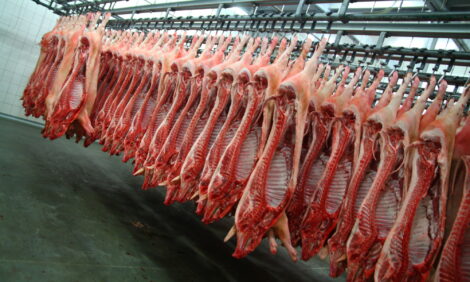



Ireland Moves Quickly to Tackle Dioxin Alert
The Irish food safety and marketing authorities have been working flat out to limit the damage to the pig meat industry caused by the discovery that some products might have been infected with dioxins through contaminated feed, writes ThePigSite senior editor, Chris Harris.The police have launched an inquiry into the source of the contamination.
And the food authorities acted swiftly to withdraw products from the shelves and to allay consumer fears.
The swift action shows the lessons learned from other food safety crises that have been experienced across Europe - not least the last major dioxin scare to hit Europe in Belgium in 1999.
During that incident, the lack of action led to consumer panic and also cost the jobs of the agriculture and health ministers in the country.
The Belgian crisis saw hundreds of farms in Belgium, the Netherlands and France prevented from selling their products, imports of Belgian food banned across the US, Africa, Asia and the Middle East.
The uncertainty that surrounded the discovery that dioxin contaminated fat had been used to make feed for poultry, pigs and cattle, left consumers "in a fog" about which products were safe, according to a report in Le Soir at the time.
And it saw the government admitting it had no systems in place to check the ingredients of animal feed.
What are Dioxins?Dioxins and polychlorinated biphenols (PCBs) are chemicals that get into food from the environment. They have no immediate effect on human health but can cause problems if they are absorbed into the human body at high levels for long periods. |
However, the Irish food authorities' swift removal of products from supermarket shelves and messages from food safety experts that the risk to humans if the products had been eaten were minimal has helped to bolster the Irish industry at a time of need.
The analytical results confirmed the presence of very high levels of dioxins in pork meat, about 100 times the EU maximum level of 1 picogramme/gram fat for dioxins and 1.5 picogramme/gramme fat for the sum of dioxins and dioxin-like PCBs.
"Rebuilding market confidence in Irish pork and bacon is now an absolute priority for Bord Bia working with the Irish pig meat industry in the wake of the weekend's comprehensive product recall," said to Aidan Cotter, Chief Executive, Bord Bia.
"Annual exports of Irish pig meat amount to €368 million, over €1 million per day, and a comprehensive action plan is now being prepared to secure our international trade, while also restoring consumer confidence on the crucially important domestic market."
Bord Bia is currently developing a tailored consumer information campaign to accompany the imminent return of Irish pork and bacon back onto retail shelves.
The campaign will highlight products produced after 7 December and that have been unaffected by the events leading up to the current pork and bacon product recall.
Through its network of international offices Bord Bia is also working closely with exporters to communicate and reassure customers about the prompt and comprehensive set of measures that have been taken by the Irish authorities in relation to the recall.
"The industry has developed an excellent track record with its customers in overseas markets and Bord Bia's focus now is to ensure these relationships are leveraged effectively as the industry seeks to re-build its market positions into the future," said Mr Cotter.
Meanwhile an international media monitoring programme has been put in place in all key markets and Bord Bia is ensuring any additional information is supplied and clarifications are made as appropriate.
Beatrice Blake, Bord Bia's general manager in London said that they were following the guidelines outlined by the Food Safety Authority of Ireland and by the chief executive.
She said that responsible reporting of the events highlighting the minimal risk that is posed to consumers has helped to ease consumer concerns.
"We acted as soon as we had full information," she said.
"We acted to protect consumer health and the reputation of the industry. We want to be back in business as soon as possible."
In the UK, one of Ireland's leading destinations for meat exports, the industry organisations the British Pig Executive and the National Pig Association said they were working closely together to monitor the situation.
The organisations were in contact with the authorities at the start of the crisis and said they were continuing to monitor the situation closely.
The contamination may have originated in the plastic packaging used for the feed.
The reports from Ireland showed that the contaminated feed had been delivered to 47 farms of which nine were pig farms.
The contaminated feed was also delivered to beef cattle farms, but as the use of this feed in cattle diets is much more limited than for pigs, and none of the farms were dairy farms, the level of alert has been less marked.
These affected farms have been blocked until an investigation which is taking place can determine if the beef had been affected to any dangerous degree.
However, the concern over pig meat products was greater because the 10 farms that has been supplied with the contaminated feed, supply 10 per cent of the Irish market and the meat was subsequently processed in plants that supply 80 per cent of the Irish processed pork market.
The Irish industry decided on the mass withdrawal of products because it was virtually impossible to trace back the contaminated products to the farms in question leaving non-contaminated products on the shelves.
Not only is the contamination the subject of a police investigation in Ireland, but the European Commission is also forming its own inquiry.
A spokesman for the European Commission said: "The Commission will organise within very short notice a meeting with the competent authorities from the affected Member States to share information and to ensure a harmonised enforcement approach across the affected Member States to ensure a high level of human health protection."








